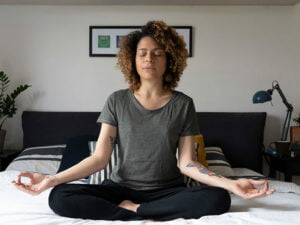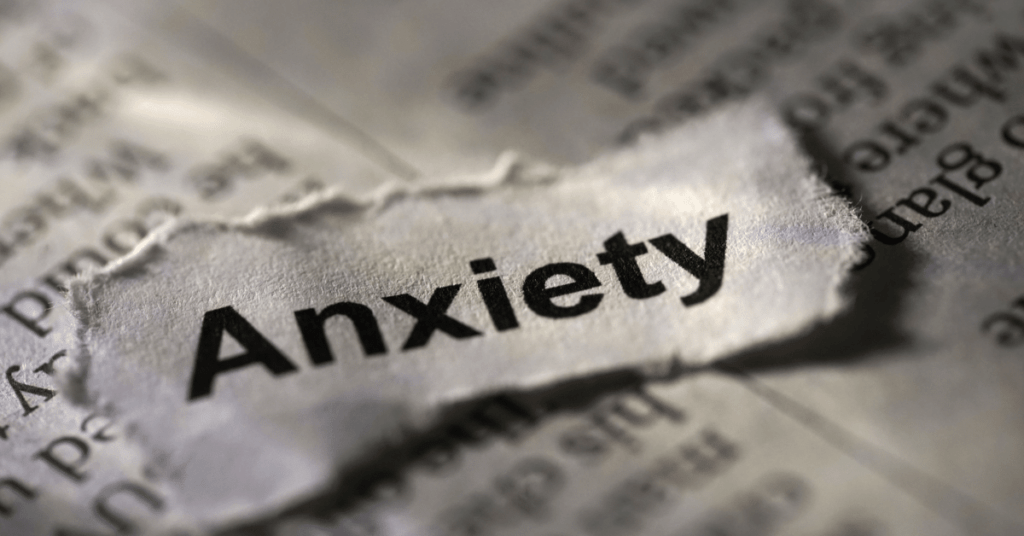It is possible to be anxious or worried without having a disorder. It is both normal and healthy to be anxious in certain circumstances, for example, if you are worried about your safety, the safety of someone else, or event planning. But if you find yourself worrying too much often, experiencing panic attacks, or feeling like it is hard to function on a daily basis you may have anxiety.
Anxiety is much more than just a temporary feeling. It can severely impact your daily life and lead to serious health problems if left untreated.
Contents
What Is An Anxiety Test?

Anxiety tests are designed to measure the level of anxiety, or stress. If you’re experiencing persistent and ongoing stress that is impacting your ability to live your life as you want, then an anxiety test may be a good way to determine if you have a problem with anxiety.
Different tests require different things from you, so one type of anxiety test might not work for every person who is in need of a test. Some types of tests can be done online in privacy in front of a computer screen. Other anxiety tests will require that you visit a clinic or hospital.
In order to get the most accurate result from an anxiety test, it’s important that you answer honestly and do it when you’re feeling calm. If you do the test when you’re stressed and anxious, it may lead to a false negative.
Anxiety tests can be done alone or with a group of people who are experiencing similar problems with anxiety. However, if you want to get an accurate result from your anxiety test, it’s important that you only take the test once. Repeated tests can lead to a false-positive result.
If you do the test repeatedly without making changes to your life, it may indicate a problem where there isn’t one. If you or someone close to you is experiencing anxiety or stress on a regular basis, taking an anxiety test might be helpful in identifying any problems that need further examination.
How Accurate Are Anxiety Tests?

Anxiety tests are useful for determining what level of anxiety you might be experiencing. If you think you have some issues with stress-induced anxiety, an anxiety test can help identify the severity of your condition. The accuracy of an anxiety test depends on which type of test you take and how honest you are in answering questions. If you take a panic or stress test while feeling anxious, it’s possible that the results could give a false-negative result.
If, however, you wait until after feeling relaxed to do the test, then it should be very accurate. It’s important that you do not take the same anxiety test again without making any changes to your life if you want accurate results. It’s also recommended that you don’t do an anxiety test with someone else. If two people take the same test together, one person may answer more honestly than the other. This means that if both of them lie on some questions, neither of their answers can be trusted as accurate or true.
If you feel like you need to take anxiety tests on a regular basis, it’s a sign that something may be wrong. You should speak with a trusted doctor or health care professional about what you’re going through so he can help determine if there is a serious problem and how to best address it. Anxiety tests are useful for assessing anxiety levels in individuals. The accuracy of an anxiety test depends on the type of anxiety test taken and whether you answer honestly. If you take an anxiety test with someone else, make sure to let them know that honesty is key, or else accuracy will be compromised.
Types Of Anxiety Tests

There are many kinds of anxiety tests that your doctor or mental health professional may prescribe. These tests are usually used to measure how severely you are affected by your anxiety or stress, but they can help diagnose problems with mental health as well.
The most common types of anxiety tests include intelligence tests, intelligence quotient (IQ) tests, clinical interviews, self-evaluation scales and questionnaires, neuropsychological tests, and behavioral observations.
These anxiety tests can be used to determine things like how well you do certain tasks, what your IQ is, if you have a mental or physical illness that could be worsening your anxiety or stress levels, whether you have a high level of intelligence for your age group, and so on.
In some cases, these tests can be used to help diagnose mental health problems such as depression and bipolar disorder.
Certain types of anxiety tests may involve visiting a clinic or hospital for an examination with a professional. Who will determine if you have any coexisting conditions that are affecting your anxiety levels?
Before taking an anxiety test, it’s important that you do not feel anxious or stressed because you want accurate results. If you need to take anxiety tests on a regular basis. It’s best that you speak to a trusted doctor or health care professional. So they can help diagnose any possible problems.
Can I Diagnose Anxiety Online?

You can diagnose some types of anxiety online, but it will be more accurate if you visit a clinic or professional to collect the data. Certain types of anxiety tests can be completed online. So long as they are computer-based and self-administered, which means that the results will not be as accurate.
Some kinds of diagnoses that can be done online include depression, stress, and bipolar disorder. These tests are usually a questionnaire of a few different questions where you need to answer honestly.
However, these tests should not replace a visit from a qualified medical professional which is what is recommended for most cases of anxiety. There are many kinds of anxiety tests available, including intelligence tests, clinical interviews, questionnaires, and neuropsychological tests. Anxiety tests may also involve visiting a clinic or hospital for an examination with a professional who will determine if you have any coexisting conditions which are affecting your anxiety levels.
Treatment Of Anxiety
Anxiety disorders are a group of mental disorders which include generalized anxiety disorder, obsessive-compulsive disorder, panic disorder, phobias, and social anxiety. The symptoms of these conditions vary from person to person. But can be severe enough to stop someone from living their everyday lives.
The treatment for anxiety most commonly prescribed is Cognitive Behavioural Therapy. This has been proven to be one of the most effective treatments available with a success rate of over 70%. This treatment will change the way you think about your feelings and thoughts by going through a series of exercises that gradually allow you to feel less anxious. It also helps deal with any worries that you may have.
Drugs are also prescribed, these should only be used if other forms of treatment are not possible. These drugs will usually be used for a short period of time, with the maximum time period usually being around 12 weeks. Drugs like benzodiazepines can help reduce anxiety right away but they do not treat the problem. And they can lead to dependency which is why they are only prescribed over a very short amount of time.
Anxiety attacks can be very frightening and often occur at the worst possible time. When you think that one of these is imminent, then the best person to give advice will be a doctor who can prescribe drugs that help reduce anxiety such as beta-blockers. These should only be used if other forms of treatment are not possible and they should be used for a maximum period of 12 weeks.
For some people there is no specific treatment, they just need to give it time, with anxiety normally disappearing completely within a few months. In other cases, medication should be used to reduce any symptoms that are being experienced.
Techniques For Dealing With Anxiety
 Cognitive-behavioral therapy is one of the most effective treatments for anxiety. And it teaches a person to deal with the problem by changing their behavior. Disciplining a person’s thoughts and feelings can also help reduce levels of anxiety.
Cognitive-behavioral therapy is one of the most effective treatments for anxiety. And it teaches a person to deal with the problem by changing their behavior. Disciplining a person’s thoughts and feelings can also help reduce levels of anxiety.
There are a few coping skills that may help an individual better deal with symptoms of an anxiety disorder:
Use distraction when you are feeling anxious so that you do not focus on the symptoms of the anxiety disorder.
Medications For Anxiety Treatment
 There are many medications available for treating an anxiety disorder, and they should only be used after receiving a prescription from a physician. Some drugs which may be prescribed by a doctor include:
There are many medications available for treating an anxiety disorder, and they should only be used after receiving a prescription from a physician. Some drugs which may be prescribed by a doctor include:
- Benzodiazepines– They can relieve anxiety symptoms but may also become addictive.
- Buspirone (Buspar)- It is a non-addictive medication that can reduce feelings of tension and worry.
- Beta-blockers- These are typically used for performance anxiety or panic disorder since they can prevent physical symptoms such as shaking fingers or rapid heartbeat.
- Antidepressants- These can be used for generalized anxiety disorder if the symptoms are also accompanied by depression. Antidepressants will not work as quickly as drugs like benzodiazepines. But they have fewer side effects and they may not cause dependency.
There is no need to suffer from an anxiety disorder alone. Since there are many treatments available that can quickly relieve symptoms and help a person live a normal life. If prescribed medications are not helping. Then there are other options available for treatment from a doctor or therapist.
Conclusion
Anxiety is a very real problem that affects many people. It can cause significant distress and impair your ability to function in day-to-day life. But it’s also common and treatable with the right support from professionals who has training in treating anxiety disorders. If you’re struggling with high levels of fear or worry on a regular basis, take this test to find out if you might have an anxiety disorder. Afterward, browse our blog posts for more information about what treatments are available and how to start coping today.
For more information, please contact MantraCare. Anxiety is a feeling of fear, worry, and unease often related to an upcoming event or uncertain outcome. If you have any queries regarding Online Anxiety Counseling experienced therapists at MantraCare can help: Book a trial Anxiety therapy session


